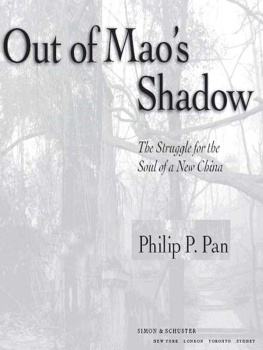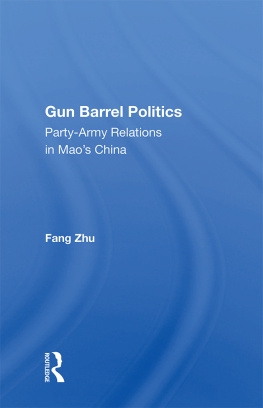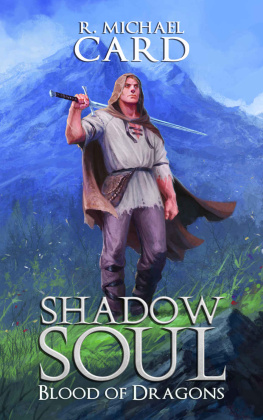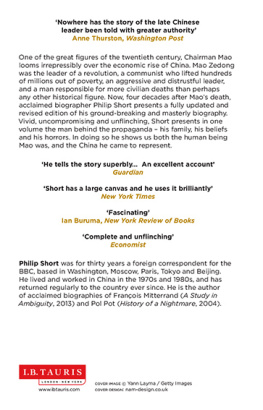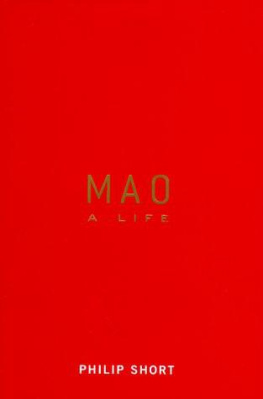Philip P. Pan - Out of Maos Shadow: The Struggle for the Soul of a New China
Here you can read online Philip P. Pan - Out of Maos Shadow: The Struggle for the Soul of a New China full text of the book (entire story) in english for free. Download pdf and epub, get meaning, cover and reviews about this ebook. year: 2008, publisher: Simon & Schuster, genre: Politics. Description of the work, (preface) as well as reviews are available. Best literature library LitArk.com created for fans of good reading and offers a wide selection of genres:
Romance novel
Science fiction
Adventure
Detective
Science
History
Home and family
Prose
Art
Politics
Computer
Non-fiction
Religion
Business
Children
Humor
Choose a favorite category and find really read worthwhile books. Enjoy immersion in the world of imagination, feel the emotions of the characters or learn something new for yourself, make an fascinating discovery.
- Book:Out of Maos Shadow: The Struggle for the Soul of a New China
- Author:
- Publisher:Simon & Schuster
- Genre:
- Year:2008
- Rating:3 / 5
- Favourites:Add to favourites
- Your mark:
- 60
- 1
- 2
- 3
- 4
- 5
Out of Maos Shadow: The Struggle for the Soul of a New China: summary, description and annotation
We offer to read an annotation, description, summary or preface (depends on what the author of the book "Out of Maos Shadow: The Struggle for the Soul of a New China" wrote himself). If you haven't found the necessary information about the book — write in the comments, we will try to find it.
Philip P. Pan: author's other books
Who wrote Out of Maos Shadow: The Struggle for the Soul of a New China? Find out the surname, the name of the author of the book and a list of all author's works by series.
Out of Maos Shadow: The Struggle for the Soul of a New China — read online for free the complete book (whole text) full work
Below is the text of the book, divided by pages. System saving the place of the last page read, allows you to conveniently read the book "Out of Maos Shadow: The Struggle for the Soul of a New China" online for free, without having to search again every time where you left off. Put a bookmark, and you can go to the page where you finished reading at any time.
Font size:
Interval:
Bookmark:

I LLUSTRATION C REDITS
Philip P. Pan: title page, Chapter 3, Chapter 10
Courtesy of Hu Jie: Chapter 2
Ji Guoqiang/ImagineChina: Chapter 6
Gao Zhan: Chapter 8(both photos), Chapter 9, Chapter 10
Taozi: Chapter 7
He Longsheng: Chapter 10
 Simon & Schuster Simon & Schuster1230 Avenue of the Americas New York, NY 10020 |
Copyright 2008 by Philip P. Pan
All rights reserved, including the right to reproduce this book or portions thereof in any form whatsoever. For information address Simon & Schuster Subsidiary Rights Department,
1230 Avenue of the Americas, New York, NY 10020.
SIMON & SCHUSTER and colophon are registered trademarks of Simon & Schuster, Inc.
Library of Congress Cataloging-in-Publication Data
Pan, Philip P.
Out of Maos shadow/Philip P. Pan.
p. cm.
Includes bibliographical references.
1. ChinaSocial conditions19762000. 2. ChinaSocial conditions20003. ChinaHistory1949 I. Title.
HN733.5.P36 2008
306.20951'09045dc22 2008011550
ISBN-13: 978-1-4165-7989-2
ISBN-10: 1-4165-7989-3
Visit us on the World Wide Web:
http://www.SimonSays.com
For Sarah and Mookie,
and for my parents


O n a warm Friday night in the summer of 2001, I stood amid hundreds of thousands of young Chinese pouring into Tiananmen Square in a joyous and largely spontaneous celebration of Beijings successful bid to host the Summer Olympics in 2008. As fireworks lit the sky and blasts from car horns echoed across the city, the exultant crowd pushed through lines of riot police, filling the square and its surrounding boulevards. Beijing! Beijing! the revelers chanted, many of them waving little red Chinese flags. Long live the motherland! Long live the motherland! University students shimmied up traffic lamps, singing the national anthem and patriotic hymns such as Without the Communist Party, There Would Be No New China. Shirtless young men ran laps around the square, trailing red and green banners and shouting obscenities in jubilation. Bicycles, motorbikes, pedicabs, and cars packed the streets, the giddy people on board flashing victory signs. From atop the Gate of Heavenly Peace, where Mao Zedong proclaimed the establishment of the Peoples Republic of China in 1949 and where his portrait still hangs, the men at the helm of the Communist Party looked out on the masses and basked in the outpouring of national pride.
I had arrived in Beijing only months earlier, a new China correspondent for the Washington Post, and the collective outburst of joy in the political heart of the nation took me by surprise. Not since the prodemocracy demonstrations in 1989 had so many people converged on Tiananmen, and the contrast was inescapable and jarring. Back then, the multitudes of young people who filled the square were protesting the corruption of the Communist government and calling for democratic reform. The army crushed those protests, and in the early 1990s, when I was studying Mandarin in Beijing, the memory of the massacre still darkened university campuses. But now people seemed to have forgotten the partys violent suppression of the democracy movement, and the crowds in Tiananmen were cheering the government. What had happened to the demands for political change? How had the party regained its footing? And how long could it hold on to power?
Over the next seven years, I searched for answers to these questions, a quest that took me to cities, towns, and villages across China. What I found was a government engaged in the largest and perhaps most successful experiment in authoritarianism in the world. The West has assumed that capitalism must lead to democracy, that free markets inevitably result in free societies. But by embracing market reforms while continuing to restrict political freedom, Chinas Communist leaders have presided over an economic revolution without surrendering power. Prosperity allowed the government to reinvent itself, to win friends and buy allies, and to forestall demands for democratic change. It was a remarkable feat, all the more so because the regime had inflicted so much misery on the nation over the past half century. But as I examined the partys success, I also saw something else extraordinarya people recovering from the trauma of Communist rule, asserting themselves against the state and demanding greater control of their lives. They are survivors, whose families endured one of the worlds deadliest famines during the Great Leap Forward, whose idealism was exploited during the madness of the Cultural Revolution, and whose values have been tested by the booming economy and the rush to get rich. The young men and women who filled Tiananmen Square in the spring of 1989 saw their hopes for a democratic China crushed in a massacre, but as older, more pragmatic adults, many continue to pursue political change in different ways.
In the three decades since Mao Zedongs death, China has undergone a dizzying transformation. A backwater economy has become a powerhouse of manufacturing and trade, with growth rates that are the envy of the world. Skyscrapers have sprouted from rice paddies, gleaming cities from fishing villages. Infant mortality is down, and incomes and life expectancy are up. With economic change has come political progress, too. The terror campaigns that Mao favored, the mass denunciation meetings, the frenzied crowds of youngsters waving little red booksthey are all things of the past. People enjoy greater prosperity but also greater personal freedom and access to information than ever before under Communist rule. By almost any measure, the countrys last twenty-five years have been the best in its five-thousand-year history. But the Chinese people have not yet escaped Maos shadow. A momentous struggle is under way for the soul of the worlds most populous nation. On one side is the venal party-state, an entrenched elite fighting to preserve the countrys authoritarian political system and its privileged place within it. On the other is a ragtag collection of lawyers, journalists, entrepreneurs, artists, hustlers, and dreamers striving to build a more tolerant, open, and democratic China.
The outcome of this struggle is important not only because half of the planets population without basic political freedoms lives in China, or because other governments around the world are already copying the Chinese model to curb demands for democratic change by their own peoples. It is also important because what kind of country China becomesdemocracy, dictatorship, or something in betweenwill help answer one of the pressing questions of our time: How will the rise of China affect the rest of the world? In other words, the future of the Chinese political system could define how China behaves as an emerging global power, how it interacts with its neighbors in Asia and with that nation watching it so closely on the other side of the globe, the United States.
This book is an attempt to describe the battle for Chinas future through the eyes of a handful of men and women. I begin in Part I with the efforts of individuals to unearth and preserve the nations tragic recent history. The partys ability to rewrite the past is critical to its grip on the present and the future, and it has tried to maintain a sanitized account of events that serves to justify its rule. But, from the violent beginnings of Chinese communism to the Tiananmen Square massacre, society is beginning to recover the truth. Part II explores how the party evolved after Maos death and adapted to survive. The totalitarian, socialist state that Mao built is no more. In its place is a more cynical, stable, and nimble bureaucracy, one that values self-preservation above all else and relies on an often corrupt and predatory form of capitalism to survive. This section tells the stories of miners and factory workers left behind and the apparatchiks and tycoons who thrived. I conclude in Part III with four ordinary people who tried to push the limits of what is permissible in China just as a new party leadership raised hopes of democratic progress. Thrust into the national spotlight, they are forced to make difficult decisions about when to fight and when to back down, and to weigh the consequences of their choices for their families and their nation.
Font size:
Interval:
Bookmark:
Similar books «Out of Maos Shadow: The Struggle for the Soul of a New China»
Look at similar books to Out of Maos Shadow: The Struggle for the Soul of a New China. We have selected literature similar in name and meaning in the hope of providing readers with more options to find new, interesting, not yet read works.
Discussion, reviews of the book Out of Maos Shadow: The Struggle for the Soul of a New China and just readers' own opinions. Leave your comments, write what you think about the work, its meaning or the main characters. Specify what exactly you liked and what you didn't like, and why you think so.

